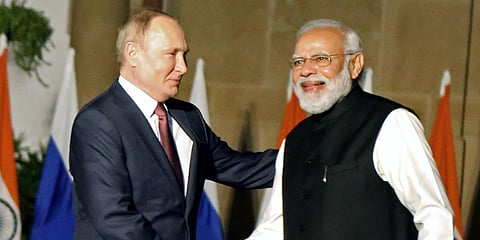Modi, Putin discuss trade, energy and food markets
NEW DELHI: Prime Minister Narendra Modi spoke to Russia President Vladimir Putin on Friday. The two leaders discussed the state of global energy and food markets in the backdrop of the Ukraine crisis, apart from ways to enhance bilateral trade in sectors like agricultural goods, fertilisers and pharma products.
Modi also reiterated India’s long-standing position on the situation in Ukraine and favoured dialogue and diplomacy to resolve it, according to a statement issued by the Prime Minister’s Office (PMO). The two leaders also agreed to maintain regular consultations on global and bilateral issues, it added.
“The two leaders reviewed the implementation of the decisions taken during President Putin’s visit to India in December 2021. In particular, they exchanged ideas on how bilateral trade in agricultural goods, fertilisers and pharma products could be encouraged further,” the statement said.
The Kremlin said Modi and Putin discussed “topical” issues relating to bilateral relations, paying “special attention to the further development of mutually beneficial ties in the economic sphere”. Putin stressed that Russia “has been and remains” a reliable supplier of grain, fertilisers and energy to India, among other nations.
The Kremlin statement said the two leaders also expressed mutual intention for strengthening of the special strategic partnership between Russia and India. On the global food crisis, the Kremlin said Putin “drew attention to the systemic mistakes made by a number of states, which led to the disruption of the entire architecture of the free trade of food products and provoked a significant increase of their cost”. The “illegitimate sanctions” against Russia had exacerbated an already difficult situation and that the same factors had a negative impact on the global energy market, it added.
The Modi-Putin telephonic talks, the fourth this year, came days after the PM attended the G-7 summit in Germany. The two leaders held last spoken on March 7.
Pushing for port link
On Wednesday, Putin had strongly pushed the International North South Transport Corridor (INSTC) as a key connectivity link between Russia and India via Iran while addressing the 6th Caspian Sea Summit held in Ashgabat.
The 7,200-km-long, “transport artery from St Petersburg to ports in Iran and India”, as he described it, can transport goods between St Petersburg in Russia to ports in India in just 25 days, instead of 40 days.
A trial load (of two 40 feet containers of wood laminates) on the INSTC was dispatched earlier this month from St Petersburg and is expected to reach Nava Sheva terminal in Mumbai next week.
It will take 25 days and reduce transportation costs by $2500 per 15 tonnes of cargo. “India considers INSTC as a viable alternative to China’s Belt and Road Initiative. India’s ability to have smooth access to Chabahar and its freight forwarding facilities is crucial to INSTC’s viability,” said sources.
- India’s top exports: Electrical machinery, Pharma, boilers, iron and steel, organic chemicals, fish, tea, coffee, spices
- India’s top imports: crude oil, coal, soyabean oil & fertilizers
- India’s crude oil imports from Russia have jumped over 50 times since April
- 10% of India’s crude oil imports in from Russia
- 0.2% was Russia’s share in India’s oil import before the Ukraine conflict

